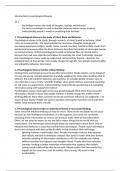Summary
(Partial) Summary of the course Introduction to Psychological Theories
- Course
- Institution
- Book
This is a partial summary of the (minor) course Introduction to Psychological Theories (PSMIN11). The summary is based on the 7th edition of the book: Psychological Science.
[Show more]



